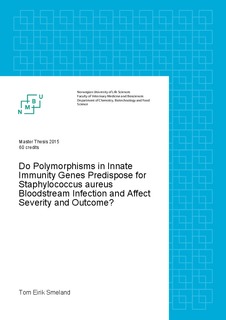| dc.description.abstract | Single nucleotide polymorphisms (SNPs) in genes encoding several of the proteins involved in the
human immune system may have an effect on the host’s susceptibility for invasive Staphylococcus
aureus (S. aureus) infections. In this study a comparison was made between two SNPs in each of the
genes encoding the Toll-like receptor 2 (TLR2) and Toll interacting protein (TOLLIP), and these SNPs’
correlation with the predisposition for, severity and outcome of sepsis by S. aureus infection. Blood
samples from patients with S. aureus-caused sepsis at Ahus were collected in the period from the 1st
of March 2011 through the 28th of February 2013. Control samples were collected from healthy
carriers (elective, orthopaedic patients) of S. aureus during two periods; the first batch was collected
from the 1st of March 2011 to 12th of June 2014 and the second from the 9th of September 2013 to
12th of June 2014 at Ahus. All samples were analyzed using PCR.
For TOLLIP rs5743942, TLR2 rs5743704 and TLR2 rs5743708, no statistically significant difference was
observed in the distribution of SNPs (P> 0.05) between the sepsis group and the control group. For
TOLLIP rs5743867 there was a significant difference (P=0.046) with Chi-square test, but neither the
crude nor adjusted multinomial logistic regression model could detect a significant difference. SNP
variant had no effect on the severity or mortality following sepsis.
The susceptibility, severity and mortality of S. aureus bloodstream infections cannot be attributed
merely to these point mutations in the genes encoding the TLR2 and TOLLIP proteins. The underlying
mechanisms of sepsis are probably more complex, and may involve specific characteristics of both
the pathogen and the host that might have a certain “lock-and-key” aspect to it.
NORSK
Enkel nukleotid polymorfismer (SNPs) i gener som koder for flere av proteinene involvert I det
humane immunsystem kan ha en effekt på vertens risiko for invasive Staphylococcus aureus
infeksjoner. I denne studien ble to SNP’er i hver av genene for Toll-liknende reseptor 2 og Tollinteragerende
protein korrelert med risikoen for-, alvorlighetsgraden- og utfallet av sepsis, forårsaket
av S. Aureus. Blodprøver fra pasienter med S. aureus positiv blodkultur på Ahus ble samlet inn i
perioden fra 1. Mars 2011 til 28. Februar 2013. Kontrollprøver ble samlet inn fra friske bærere
(elektive, ortopediske pasienter) av S. aureus i to perioder. Første gruppe ble samlet inn fra 1. Mars
2011 til 12. Juni 2014, andre gruppe fra 9. September 2013 til 12. Juni 2014 på Ahus. Alle prøvene ble
analysert ved hjelp av PCR.
For TOLLIP rs5743942, TLR2 rs5743704 og TLR2 rs5743708 var det ingen statistisk signifikant forskjell
i distribusjon av alleler (P>0.05) mellom sepsisgruppen og kontrollgruppen. For TOLLIP rs5743867 var
det signifikant forskell i Kji-kvadrat test (P=0.046) men ingen signifikant forskjell ved justert og
ujustert multinomial logistisk regressjonsmodell. SNP variant hadde ingen effekt på
alvorlighetsgraden og mortaliteten av sepsis.
Mottakelighet, alvorlighetsgrad og mortalitet forårsaket av S. Aureus infeksjon i sirkulasjonssystemet
kan ikke tilskrives kun punktmutasjoner i disse polymorfismene i genene for TLR2 og TOLLIP.
Mekanismene involvert i utviklingen av sepsis er antakelig mer komplekse, og involverer muligens
spesifikke karakteristikker i både vert og bakterie med et visst lås-og-nøkkel aspekt ved seg. Enkel nukleotid polymorfismer (SNPs) i gener som koder for flere av proteinene involvert I det
humane immunsystem kan ha en effekt på vertens risiko for invasive Staphylococcus aureus
infeksjoner. I denne studien ble to SNP’er i hver av genene for Toll-liknende reseptor 2 og Tollinteragerende
protein korrelert med risikoen for-, alvorlighetsgraden- og utfallet av sepsis, forårsaket
av S. Aureus. Blodprøver fra pasienter med S. aureus positiv blodkultur på Ahus ble samlet inn i
perioden fra 1. Mars 2011 til 28. Februar 2013. Kontrollprøver ble samlet inn fra friske bærere
(elektive, ortopediske pasienter) av S. aureus i to perioder. Første gruppe ble samlet inn fra 1. Mars
2
2011 til 12. Juni 2014, andre gruppe fra 9. September 2013 til 12. Juni 2014 på Ahus. Alle prøvene ble
analysert ved hjelp av PCR.
For TOLLIP rs5743942, TLR2 rs5743704 og TLR2 rs5743708 var det ingen statistisk signifikant forskjell
i distribusjon av alleler (P>0.05) mellom sepsisgruppen og kontrollgruppen. For TOLLIP rs5743867 var
det signifikant forskell i Kji-kvadrat test (P=0.046) men ingen signifikant forskjell ved justert og
ujustert multinomial logistisk regressjonsmodell. SNP variant hadde ingen effekt på
alvorlighetsgraden og mortaliteten av sepsis.
Mottakelighet, alvorlighetsgrad og mortalitet forårsaket av S. Aureus infeksjon i sirkulasjonssystemet
kan ikke tilskrives kun punktmutasjoner i disse polymorfismene i genene for TLR2 og TOLLIP.
Mekanismene involvert i utviklingen av sepsis er antakelig mer komplekse, og involverer muligens
spesifikke karakteristikker i både vert og bakterie med et visst lås-og-nøkkel aspekt ved seg. | nb_NO |
